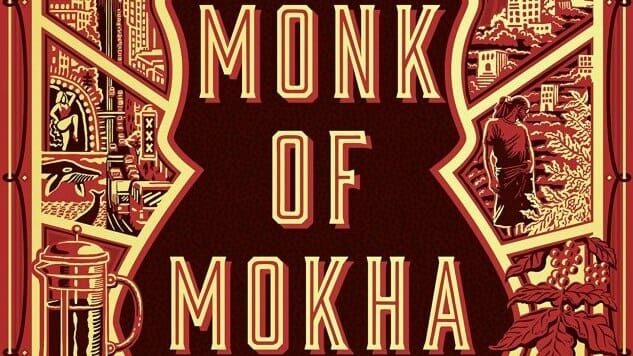Dave Eggers’ The Monk of Mokha Puts a Human Face on a Forgotten War

In The Monk of Mokha, Dave Eggers chronicles the true story of an aspiring coffee importer caught in the outbreak of the Yemeni Civil War. After meeting the man, Mokhtar Alkhanshali, in Oakland, Eggers retraced Alkhanshali’s steps through Yemen, Ethiopia and Djibouti, garnering insight from his narrative’s hero along the way.
The Monk of Mokha opens as Alkhanshali, then a 24-year-old Yemeni American doorman, is looking for a new direction in his life. He discovers Yemen’s place in the history of coffee by chance, sparking a burning desire to help his homeland ascend—yet again—to a place of prominence in one of the world’s most valuable commodity markets. Alkhanshali’s journey from the Bay Area to Yemen parallels the path of the Yemeni coffee farmers he helps become specialty coffee producers; both ride passion and the past to levels of success previously only possible in fantasy. In managing to do so as a nation was rent by civil war, Alkhanshali’s story also serves as an important entré into an overlooked conflict.
 Against a backdrop of American drone strikes in 2015, Houthis forces from the north of Yemen, fighting alongside military forces loyal to former president Ali Abdullah Saleh (who was eventually deposed in 2012 and, after renouncing the Houthis, was assassinated in 2017), captured the capital of Sana’a and took control of the Yemeni government. They are opposed by those loyal to the government of Saleh’s successor, Abdrabbuh Mansur Hadi. An alphabet soup of terrorist groups, most notably ISIS and Al-Qaeda in the Arabian Peninsula (AQAP) have also entered the fray.
Against a backdrop of American drone strikes in 2015, Houthis forces from the north of Yemen, fighting alongside military forces loyal to former president Ali Abdullah Saleh (who was eventually deposed in 2012 and, after renouncing the Houthis, was assassinated in 2017), captured the capital of Sana’a and took control of the Yemeni government. They are opposed by those loyal to the government of Saleh’s successor, Abdrabbuh Mansur Hadi. An alphabet soup of terrorist groups, most notably ISIS and Al-Qaeda in the Arabian Peninsula (AQAP) have also entered the fray.
It’s a confusing fight for casual observers, taking place amongst a myriad of combatants and in a country unfamiliar to many Americans. But Eggers uses the cultural history of coffee to help contextualize the nation; while coffee originated in Ethiopia, it was first cultivated and brewed in a drink resembling the one we know now in Yemen. Exports of the bean made Mokha, Yemen a powerful port, and the series of thefts which resulted in coffee’s spread around the globe serves as a microcosm for Eastern and Western relations.
Just as the history of coffee helps to secure Yemen’s place in the geography of the mind, experiencing the outbreak of the civil war from Alkhanshali’s vantage point sets the war. From blood and bodies and bullets, Alkhanshali’s experience—his tragic adventure—provides a small, developing sample of a whole, a Polaroid flash in a black sea.
As hot spots flare up across the globe, the international spotlight dances wildly, swinging from one conflict or humanitarian crisis to the next, alighting on one threat or another—Iraq, Afghanistan, Syria, Crimea, Boko Haram in Nigeria, skirmishes in the Sahel, the plight of the Rohingya in Myanmar and Bangladesh. Soldiers, civilians, humanitarians and reporters risk their lives as moments of monumental upheaval pull across the globe as tides to a bloody, invisible moon.
The new, irregular conflicts that make up the ever-shifting face of modern war—and our ability in the Global North to consume media practically any place, any time—dampens our ability to understand and empathize with those who find themselves imperiled. But in following Alkhanshali as he dodges Saudi bombing runs and the AK-47s of various factions, Eggers inserts us directly into a conflict we need to understand. What happens in a Gulf State thousands of miles from American soil may not seem cogent to our everyday life, but what happens to one society has an indelible effect on us all.
The Monk of Mokha is a small, and therefore inevitably incomplete, portrait of the war. It’s remarkably bloodless, practically picaresque, but it’s also approachable. When we can put names and faces to these events—when we know that the coffee in our cup may have been produced, miraculously, in the face of a civil war—we can strip away the veils of distance and cultural difference, empathize and understand our world and the violence which roils it.
B. David Zarley is a freelance journalist, essayis, and book/art critic based in Chicago. A former book critic for The Myrtle Beach Sun News, he is a contributing reporter to A Beautiful Perspective and has been seen in The Atlantic, Hazlitt, Jezebel, Chicago, Sports Illustrated, VICE Sports, Creators, Sports on Earth and New American Paintings, among numerous other publications. You can find him on Twitter or at his website.







































